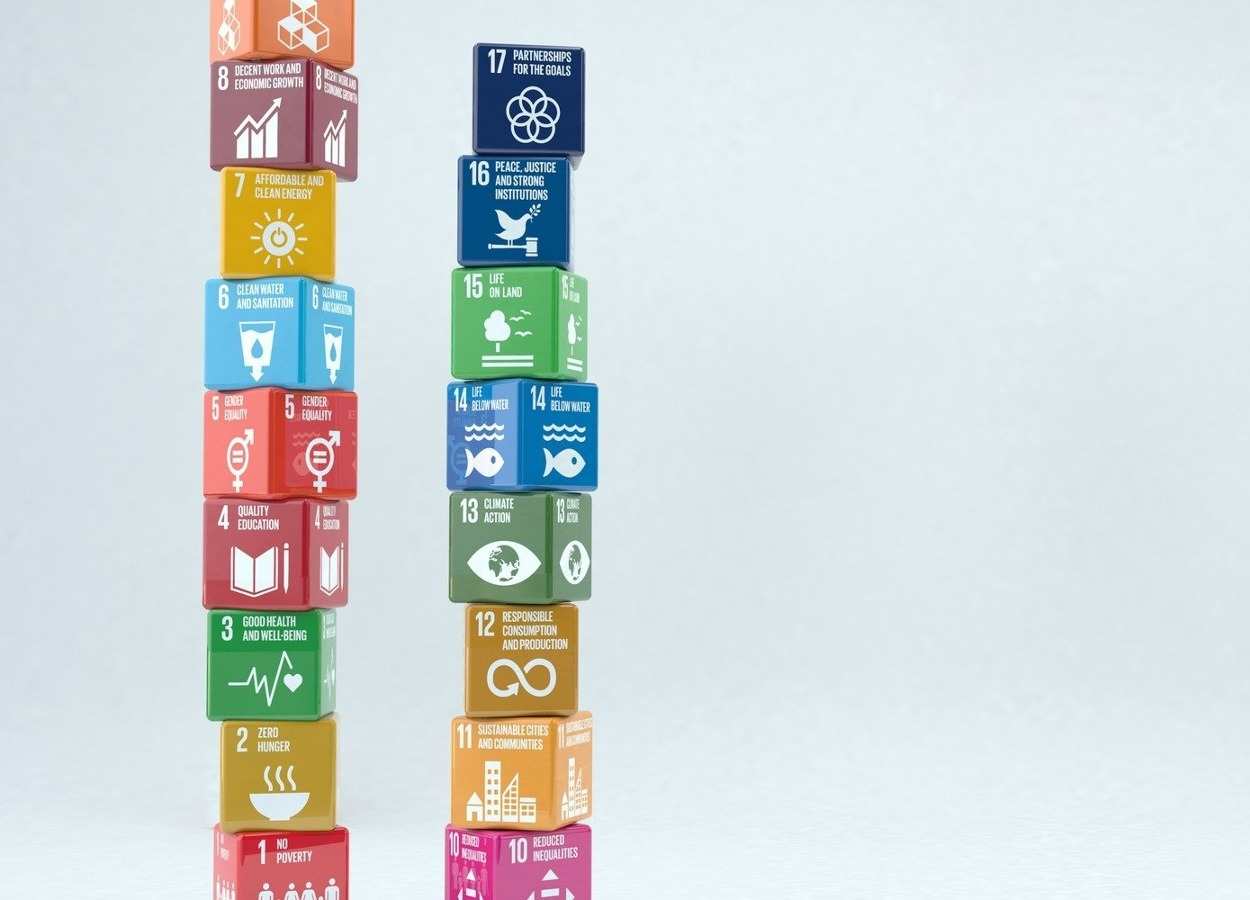In 2015, the United Nations (UN) member states launched the 17 Sustainable Development Goals (SDGs) to end global poverty, advance health and education, reduce inequality, protect the environment, and accelerate economic growth. Countries worldwide, in partnership with the private sector, are coordinating action to achieve the UN SDGs by 2030. For companies, the SDGs present a significant opportunity to align corporate sustainability goals with global priorities, to enhance co-investment, collective action, and impact.
Yet, with 17 ambitious goals and more than 100 sub-goals, it can be hard for companies to know which SDGs to support. Where to start? Certainly, a company will be guided by its own supply chain sustainability challenges and impact goals. But we’d also argue that some SDGs are particularly suited for private sector co-investment and collaboration—either because they are inextricably linked to global supply chains or because they simply cannot be achieved without cross-sector engagement. And then there’s the moment we’re living in now: COVID-19 has heightened the urgency of certain key SDGs, making it clear that immediate and aggressive cross-sector action is needed for global recovery and stability.
6 Priority Sustainable Development Goals (SDGs) for Company Action and Collaboration
As companies look to make a difference in 2022 and beyond, we have identified 6 high-priority UN Sustainable Development Goals where the private sector can partner with governments, donors, NGOs, and communities to drive sustainable impact and business value. We’ve selected these SDGs based on their urgency in this present moment, their impact on the private sector, and the extent to which cross-sector collaboration is needed to meaningfully move the needle.
1. Partner to Expand Health Access
Sustainable Development Goal 3.8: Achieve universal health coverage, including financial risk protection, access to quality essential healthcare services, and access to safe, effective, quality, and affordable essential medicines and vaccines for all.
We enter 2022 with huge disparities in vaccination rates between rich and poor nations, with low-income countries facing continued challenges in accessing and paying for vaccines. Beating a global pandemic requires global solutions: Here, companies can develop partnerships with host governments and donors to pool resources to negotiate vaccine purchases, create viable distribution channels, and license production in emerging markets in Africa, Asia, and Latin America. This is an essential step toward advancing health equity, defusing COVID-19, and opening the door for global economic recovery.
The pandemic has also massively disrupted basic health services and health systems worldwide, with wide-reaching implications. Now, the private sector has a critical role to play in responding to a changing healthcare landscape, innovating new digital health solutions, and creating new and better health delivery models.
2. Partner to Extend Internet Access and Bridge the Digital Divide
Sustainable Development Goal 9.c: Significantly increase access to information and communications technology and strive to provide universal and affordable access to the Internet in least developed countries.
COVID-19 laid bare the importance of broadband Internet for enabling people to work, educate their children, and access critical health information. However, nearly half the world’s population is without Internet access.
Technology companies, telecommunications operators, donors, and development finance institutions must work together to bridge the digital divide and ensure universal Internet access. This is an area of considerable cross-sector interest and private sector opportunity.
3. Partner to Take on Climate Change
Sustainable Development Goal 13: Take urgent action to combat climate change and its impacts.
Climate change is the ultimate cross-sector problem—and engaged and aggressive action from the private sector will be essential to progress. As more and more businesses commit to net-zero targets, they’re partnering to advance renewable energy, restore and protect forests, and scale climate-smart and regenerative agriculture practices.
Climate finance is also a prime area for collaboration: Mobilizing private climate finance was a central theme at last year’s UN Conference of the Parties (COP26). (And we saw some glimmers of hope: The Glasgow Financial Alliance for Net Zero—a group of nearly 500 global financial services firms—pledged to align $130 trillion in financial assets with global climate goals, including net-zero emissions by 2050 and a 50% reduction in emissions by 2030.)
With ever greater pressure to commit, report, and lead on climate, more companies will be partnering creatively to meet their climate goals in 2022.
4. Partner to Boost the Resilience, Sustainability, and Productivity of Agricultural Systems
Sustainable Development Goal 2.4: By 2030, ensure sustainable food production systems and implement resilient agricultural practices that increase productivity and production, that help maintain ecosystems, that strengthen capacity for adaptation to climate change, extreme weather, drought, flooding and other disasters and that progressively improve land and soil quality.
COVID-19 disrupted global and domestic food supply chains and curbed food production, causing global hunger to rise precipitously. This has exacerbated the failings of an already unstable system: climate change will continue to wreak havoc on global agricultural supply chains. Only together can companies, governments, and farmers create more resilient, stable, and productive agricultural systems. This will require pre-competitive and cross-sector partnerships to co-develop and scale new agricultural solutions and innovations.
5. Partner to Reduce Food Waste and Post-Harvest Losses
Sustainable Development Goal 12.3: By 2030, halve per capita global food waste at the retail and consumer levels and reduce food losses along production and supply chains, including post-harvest losses.
Food waste is an enormous contributor to greenhouse gas emissions and, therefore, represents a tremendous opportunity for reducing emissions and enhancing food security. It’s also an extremely complicated problem that requires changes to industry practices, consumer behavior, and government policy to fix. This is an area primed for private sector leadership in 2022, especially with more companies embracing circular economy principles for the future of food.
6. Partner to Advance Opportunity and Impact for Diversity, Equity, and Inclusion (DEI)
Sustainable Development Goal 10.3: Ensure equal opportunity and reduce inequalities of outcome, including by eliminating discriminatory laws, policies and practices and promoting appropriate legislation, policies and action in this regard.
We’re in a period of social transformation. Companies have been looking closely at how they can invest meaningfully in diversity, equity, and inclusion (DEI) in their business and the communities they serve. In particular, we see a significant opportunity for companies to make an impact for DEI in their own value chains, by deliberately partnering with diverse suppliers. This integrates DEI with “core business” value and growth, lending greater potential for true sustainability, impact, and scale.
Cross-Sector Collaboration to Achieve Sustainable Development Goals
Meeting the ambitious aims of the UN Sustainable Development Goals by 2030 will not be easy—it will require sustained investment and extensive collaboration. However, the SDGs are also a major business opportunity. The UN has identified more than $12 trillion in market opportunities for the private sector in making the SDGs a reality.
By focusing and partnering on high-priority SDGs, companies can both have a greater impact and be better positioned to realize the business opportunities that stem from making the world a more sustainable, prosperous, and equitable place.
Companies should consult with an experienced partnership development expert to learn how they can leverage strategic collaboration to capitalize on the extensive market opportunities created by the UN Sustainable Development Goals.
This blog was originally published in February 2021 and has since been updated to reflect changing priorities for Sustainable Development Goals in 2022.




